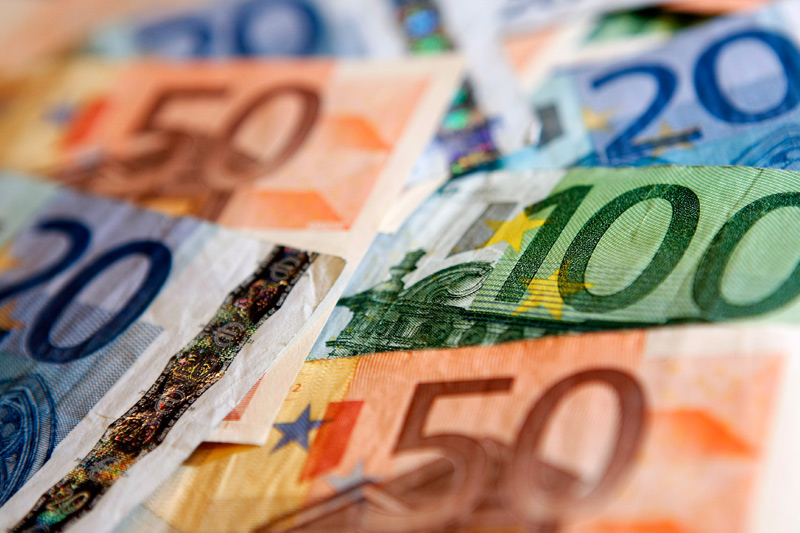By Sumanta Dey (Reuters) - The European Central Bank can still weaken the euro but only by buying sovereign bonds of the 18 countries that use the single currency, according to a majority of foreign exchange strategists polled by Reuters.
The euro <EUR/USD> has already weakened 9 percent against the dollar since the start of this year with most of the fall coming after the ECB announced measures in September aimed at boosting inflation and growth, including purchases of secured debt.
The weaker euro and of other stimulus measures have so far failed to bump up inflation, which at 0.4 percent in October is less than a quarter of the ECB's near 2 percent target. Many euro zone economies are already experiencing deflation.
The dollar has surged against every major currency in recent months as a solidifying economic recovery in the United States has stoked expectations the Federal Reserve will raise interest rates by the middle of next year. The Fed ended its long-running bond-buying program last week.
Wednesday's poll saw the euro steadily weakening against the dollar over the next 12 months but respondents said it may not easily fall much further, especially if there is any moderation in the dollar's rise, unless the ECB eases policy significantly. Buying government bonds is among the last options it has left.
Twenty-nine of 38 currency strategists who answered an extra question said the ECB could influence the euro on its own, independent of the Fed's policy decisions.
"If the ECB is successful at expanding its balance sheet while that of the Fed stays the same or contracts, then it is in a position to influence the exchange rate of the euro," said Colin Asher, senior economist at Mizuho Corporate Bank.
A Reuters poll last week showed the ECB must expand its balance sheet by 1 trillion euros, roughly the size of Mexico's economy but a fraction of what the Fed printed over half a decade, to have an impact on inflation. [ECB/INT]
That was in line with President Mario Draghi's suggestion of getting the ECB's balance sheet back to its level of 2012, although national central bankers are unhappy he disclosed a target figure after policymakers agreed not to.
"Only with sovereign bonds can the ECB hope to reach the kind of stimulus, in terms of quantity, that's comparable to the United States. No other market in the euro zone is as large," Commerzbank foreign exchange strategist Esther Reichelt said.
There is now an even chance the ECB conducts sovereign quantitative easing, or buying bonds with new money, according to a Reuters poll of traders on Monday. [ECB/REFI]
The poll of 60 currency strategists conducted this week showed the euro is expected to trade at $1.25 in a month, $1.22 in six months and $1.20 in one year.
The consensus level is lower than in last month's poll and in line with positions in the futures market, where speculators heaped short contracts on the euro last week, taking bets against the currency to their largest since July 2012.
If the euro does fall as much as predicted by October next year, it would be at its weakest in five years and should help import some inflation into the bloc and stimulate exports.
But much depends on commodity and oil prices which can negate a weaker euro's contribution to raising inflation.
Global crude oil prices have plunged by $20 a barrel in just seven weeks due to a supply glut in the market. Prices for commodities such as iron ore have also fallen owing to a slowdown in China, by far the largest consumer of raw materials.
"The depreciation of the euro, especially against the dollar, has been nearly fully compensated by decreasing industrial and energy commodity prices," said Dag Muller, analyst at SEB.
The poll also showed the Japanese yen <USD/JPY> will weaken to 116.0 per dollar in a year but trade roughly around its current rate of 114.6 over the next six months.
The dollar jumped against the yen on Friday after the Bank of Japan surprised markets by increasing its purchases of government bonds and other assets.

However, the extra stimulus effectively acknowledges the failure so far of Prime Minister Shinzo Abe's ambitious plan to raise inflation in the economy by pumping trillions of yen into the money supply.
Economists polled by Reuters cut their annual growth forecast for Japan for a fifth straight month in October, saying there is no chance the BOJ will meet its 2 percent inflation goal by the next fiscal year. [ECILT/JP]
((For other stories from the poll click on ))
(Polling and analysis by Kailash Bathija and Hari Kishan; Editing by Ross Finley and Catherine Evans)
